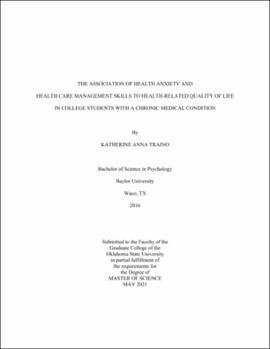| dc.description.abstract | Adolescents and young adults (AYAs) with a chronic medical condition (CMC) are often tasked with increasing independent management of their health care as they transition from pediatric to adult medical care (i.e., transition readiness). The Health Care Transition Model highlights the need to understand individual predictors for greater transition readiness and subsequent health-related quality of life (HRQoL). Based on the Yerkes-Dodson theory, it is known that optimal levels of anxiety are motivating for behavior performance. However, the role of health anxiety in the development of transition readiness among AYAs with a CMC is unclear. I hypothesized that moderate/optimal levels of health anxiety would be quadratically associated with greater transition readiness and HRQoL outcomes. Ninety-eight AYA college students (87.6% female, 79.1% white, 76.5% underclassmen, 19.54 +/- 1.26 years old) completed online surveys of demographic information, health anxiety, transition readiness, and mental and physical HRQoL. Multiple linear regression results demonstrated linear, not quadratic, relationships between health anxiety and mental, b = -.435, t(92) = -4.82, p < .001, and physical HRQoL, b = -.504, t(93) = -6.10, p < .001. Multiple linear regression results indicated no associations between transition readiness and mental and physical HRQoL, and health anxiety and transition readiness. Two exploratory moderation analyses examining interactions between health anxiety and transition readiness on mental and physical HRQoL demonstrated a significant interaction effect for physical HRQoL. Across three quartiles of health anxiety, those in the lowest quartile demonstrated that greater transition readiness was associated with greater physical HRQoL, b = 3.49, 95% CI [.721, 6.260]. These findings are partially consistent with previous research indicating that greater health anxiety is associated with worse HRQoL outcomes; however, result do not support existing findings for associations between transition readiness and HRQoL. Results from the present study extend our understanding of the role of health anxiety in health care transition and associated HRQoL outcomes. In clinical settings, examining health anxiety in AYAs transitioning from pediatric to adult care and providing necessary support may bolster long-term HRQoL outcomes. | |
